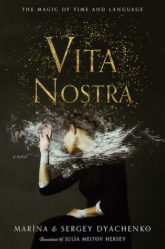Sasha Samokhina has always been an average sort of girl, if a bit overly studious—at least, that’s what she always thought before meeting the strange and imperious Farit Kozhennikov while on vacation with her mother. The bizarre tasks Kozhennikov sets her to as she goes through her final year of high school leave her with a pile of strange gold coins, used to pay for her entrance to a college she’s never heard of and has no desire to attend. But Kozhennikov gives her no choice but to attend the Institute of Special Technologies, where the lessons in Specialty are at first completely incomprehensible and the students’ transgressions and failures are punished by harm to their families. Yet Sasha continues to push forward in her studies… and soon she finds herself transformed as she discovers the truth of the “Special Technologies” she’s studying so fervently.
First published in its original Russian in 2007, Vita Nostra is the first of Marina and Sergey Dyachenko’s Metamorphosis cycle, three unconnected novels addressing themes of transformation. Julia Meitov Hersey’s translation marks the novel’s entrance into the English-language market. The novel’s title comes from the Latin song “De Brevitate Vitae,” sometimes known as “Gaudeamus Igitur,” which is frequently sung in schools in Europe and sung at the start of each school year at the Institute. The line in full is Vita nostra brevis est, or, in English, “Our life is brief.” Following Sasha from the summer before her final year of high school through the placement test in the winter of her third year of college, Vita Nostra is a novel about transformation, growth, and the inevitability of maturing into adulthood, all in the brief span of just a few years of life.
The Dyachenkos address this most obviously with the fantastical elements of the story. The novel reads at first like an ominous and mature Harry Potter: rather than an unhappy child transported to a magical school to explore almost endless possibilities, Sasha is taken from her fairly happy though mundane life and brought to a postsecondary institution with one course of study and only one possible outcome. The strangeness of the Institute is most apparent in the Specialty course, where students are given bizarre coursework: memorizing passages they can’t read and that make no sense, booklets of “exercises” that seem impossible to solve, even assignments given on CD audio tracks. Sasha is the only student in her year who takes to the assignments right away. At first, it’s a matter of forcing herself in order to maintain decent grades, but slowly she becomes addicted to completing the exercises, which loop almost rhythmically into one another.
Buy the Book


Vita Nostra
Of course, the strange assignments are key to the transformation Sasha and her classmates will experience. Each member of the small class has a specific destiny that brought them to the Institute, kept hidden from them until the students are able to realize that destiny on their own. It’s only when they’re already in too deep that the students understand exactly what’s happening to them—and Sasha, a star student who studies relentlessly, is the first in her year to reach the right conclusion.
Maturation is itself addressed as a form of transformation over the course of the novel, explored through several facets of Sasha’s life as she departs girlhood and grows into womanhood while attending the Institute. Sharing a dorm with difficult roommates, her first sexual experiences, and defying parental expectations are as much a part of her transformation as the strange effects of her studies at the Institute. And, as her relationship with younger student Yegor proves, the mundane growth Sasha experiences informs the fantastic transformation she’s undergoing as well.
Possibly the most well-done transformation in Vita Nostra is the evolving relationship between Sasha and her mother. Prior to the events of the book, Sasha and her mother were always on their own, as Sasha’s father had left them. During the same vacation on which Sasha meets Kozhennikov, Sasha’s mother meets a man named Valentin, who intrudes upon their lives in a way Sasha is entirely unaccustomed to. For the first time, Sasha’s relationship with her mother is forced to evolve, just as Sasha herself is beginning to evolve, and the shift in dynamic feels familiar to me as I reflect on the way my own relationship with my parents evolved as I completed school and moved out on my own. The tension Sasha experiences with her mother and her mother’s new partner is enough for the reader to feel her isolation and her longing for things to be as they were when she was a child, and the weight of her mother’s expectations—ones that Sasha already outgrew—is a highlight in this coming-of-age story.
Like the exercises Sasha works through in the novel, Vita Nostra seems at first to be just beyond comprehension, but as readers proceed, it becomes more and more intoxicating as understanding blooms in the reader’s mind.
Vita Nostra is available from HarperVoyager.
Feliza Casano writes about science fiction, manga, and other geeky media around the internet. She currently lives in Philadelphia, where she moderates two book clubs and lines her walls with stacks of books. Visit her online or follow her on Twitter @FelizaCasano.










